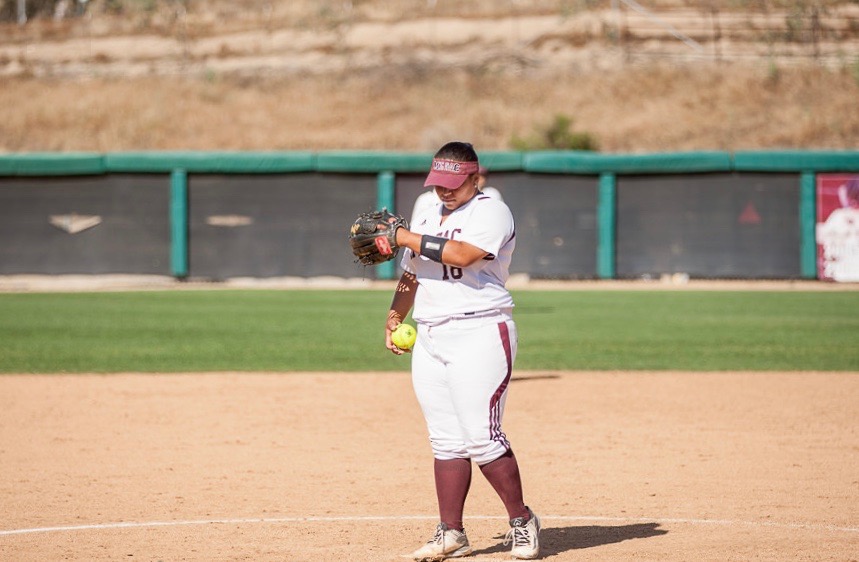Photo courtesy of David Aguilera davessportimage on Flickr
By Jessica Olvera
Assistant Sports Editor
Growing up as an athlete, you never think the time will come when you have to hang up your gear for the last time. Every second of every day is consumed with preparation, studying, workouts and trying to regenerate your body for the next day to come.
For me, sports filled a void in my life I didn’t even know I had until it was gone. I played over 16 years of softball and it allowed me to travel to different states and places, while also giving me the opportunity to meet a vast variety of teammates, coaches, and overly opinionated parents who constantly boasted about their child’s performance.
One thing my 16 years as a softball pitcher never prepared me for, however, was how quickly it could all end.
My playing clock ended during a meeting on May 1, 2019, at 12:45 p.m., just four days after I recorded my last out on the CSUDH softball field on April 27, 2019.
It wasn’t my choice. But even though I don’t think it was handled well, I understood. Toward the end of my playing career, I was plagued by injuries with two major knee surgeries and dealing with my Lupus disease, which saw my body not being able to perform at it best anymore. It was time to say goodbye even though it hurt like hell.
It still does.
In four months, I’ve cycled through emotions and feelings ranging from depressed and heartbroken, to betrayed and lost altogether.
I know I am not the only one to experience this gauntlet of emotions after the hard reality that even though you are only in your early 20s, that you are a retired college athlete. This new reality is shared with others who have gone through similar experiences with being a retired collegiate athlete. I occasionally speak with my two former teammates with whom I felt closest to. We reflect on our playing time together, along with having deep conversations about what’s next for us.
Our personal experiences are all different, but one thing we have in common is the realization that the transition to being a retired athlete is a long and lonely one that needs to be shared with others. One aspect I have shared is that I feel a part of me died during that meeting. I feel forever changed physically and mentally from the unexpected loss.
I often find myself hesitant and even resistant at times to open up about what I am going through to non-teammates for fear of judgment and to hear the triggering words “get over it already.” This leads me to become more anti-social.
When you are a college athlete, you come to realize that you really are a “different breed” when you add in the amount of pressure in your respective sport, stress on your body, time management between school and practices, and the constant need to perform at a high rate.
There is no offseason.
Summer and winter breaks for athletes are not considered vacations but a season of important preparation. This often poses an athlete to ask themselves, ‘Is this really worth it?’” And the answer is yes. It becomes something that you miss once it is all over. And when it’s over is often beyond your control. And then you’re expected to just wake up the next day and have your life figured out. At least that’s what it feels like.
An athlete goes from spending a vast amount of time perfecting their craft so that they can make a name for themselves in the sports world, to then figuring out who they are without it.
The real world without sports is harsh and very lonely. You create a type of persona for yourself while playing sports and the transition to life after is very unexpected.
After sports, the struggles of employment, depression or lack of purpose are revealed. It’s as if you are having a personal identity crisis and find yourself often relying on your identity as a sportsperson.
But you know what? That’s OK. As difficult as my transition has been, I’ve also grown from it. I think one reason is that coming from a sports background, there are definite parameters to follow, rules if you will. Stay within the boundaries of those rules, and you knew what was up. But in the non-sports world, there are no rules. To accepted way of feeling, or coping, or even who or what to turn to.
But if you are a former athlete grappling with all this, then consider this a new challenge as you would in competition during sports. Consider yourself an already well-rounded person from the adversity that you might have had to overcome as an athlete and aim for new developments and achievements in your next stage of life.
It’s OK to not have it all figured out yet. Practice every day to get used to a new routine without sports. Take pride in your past life with sports. You have to understand that not everyone is going to transition the same into the next chapter of their lives.
Surround yourself with a new “team” of people that will support you along the way during your transition and do not be afraid to fail.
Being a retired college athlete is something to be proud of. You have competed on the most elite of stages and when the end comes, it is important to remember who you are and what you have done.
Patience is important during the transition to life after sports. One day you’ll get over the bittersweet ending. Chances are that it won’t be today or tomorrow, but someday. At least that’s what I keep telling myself.
Jessica Olvera’s blog about life as a retired athlete can be found at retiredathletetransition.wordpress.com.

